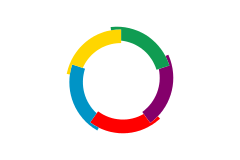Jeux de la Francophonie
The Jeux de la Francophonie (Canadian English: Francophonie Games; British English: Francophone Games) are a combination of artistic and sporting events for the Francophonie, mostly French-speaking nations, held every four years since 1989.
| Jeux de la Francophonie | |
|---|---|
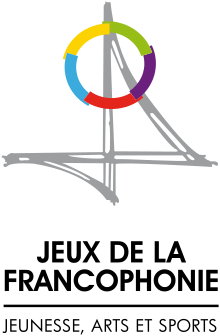 Logo of the Games | |
| Status | active |
| Genre | sports event |
| Frequency | every 4th year |
| Location(s) | various |
| Inaugurated | 1989 |
Editions
| Year | Edition | Opened by | Date | Host city | No. of Athletes (nations) |
|---|---|---|---|---|---|
| 1989 | I | Hassan II | 8–22 July | 1,700 (39) | |
| 1994 | II | François Mitterrand | 5–13 July | 2,700 (45) | |
| 1997 | III | Didier Ratsiraka | 27 August – 6 September | 2,300 (38) | |
| 2001 | IV | Adrienne Clarkson | 14–24 July | 2,400 (51) | |
| 2005 | V | Mamadou Tandja | 7–17 December | 2,500 (44) | |
| 2009 | VI | Michel Suleiman | 27 September – 6 October | 2,500 (40) | |
| 2013 | VII | François Hollande | 6–15 September | 2,700 (54) | |
| 2017 | VIII | Alassane Ouattara | 21–30 July | 4,000 (49) | |
| 2022 | IX | 23 July - 1 August |
Events
Sports
There were four sports at the inaugural event in 1989: athletics, basketball, association football and judo. Handisport, handball, table tennis and wrestling were added to the competition programme in 1994. None of these four sports featured at the 1997 Jeux de la Francophonie, and boxing and tennis were introduced to the programme instead. Eight sports featured in 2001: the four inaugural sports, boxing and table tennis were included. Furthermore, handisport and beach volleyball competitions were held as demonstration events. Neither of these demonstration sports were included in 2005, with traditional style wrestling being demonstrated in addition to the six more established sports. The 2009 programme re-introduced beach volleyball.
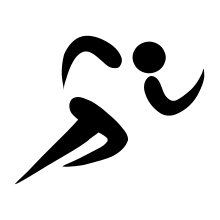
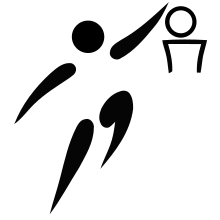
_pictogram.svg.png)

_pictogram.svg.png)
_pictogram.svg.png)
.svg.png)
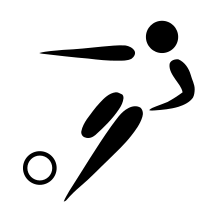






Cultural
The Jeux de la Francophonie are distinctive, if not unique, among international multi-sport competitions for including competitive cultural performances and exhibitions, complete with gold, silver, and bronze medals for winning participants.
- Song ()
- Storytelling ()
- Traditional inspiration dance ()
- Poetry ()
- Painting ()
- Photography ()
- Sculpture ()
In 2001, street art featured as a demonstration event.
Medal Table
An all-time Jeux de la Francophonie Medal Table from 1989 Jeux de la Francophonie to 2017 Jeux de la Francophonie, is tabulated below. The table is simply the consequence of the sum of the medal tables of the various editions of the Jeux de la Francophonie.[1]
| Rank | Nation | Gold | Silver | Bronze | Total |
|---|---|---|---|---|---|
| 1 | 212 | 158 | 129 | 499 | |
| 2 | 87 | 85 | 123 | 295 | |
| 3 | 65 | 83 | 69 | 217 | |
| 4 | 64 | 43 | 46 | 153 | |
| 5 | 25 | 32 | 40 | 97 | |
| 6 | 21 | 26 | 48 | 95 | |
| 7 | 20 | 24 | 22 | 66 | |
| 8 | 20 | 8 | 20 | 48 | |
| 9 | 19 | 14 | 25 | 58 | |
| 10 | 18 | 16 | 21 | 55 | |
| 11 | 16 | 31 | 40 | 87 | |
| 12 | 13 | 23 | 42 | 78 | |
| 13 | 13 | 16 | 29 | 58 | |
| 14 | 9 | 16 | 23 | 48 | |
| 15 | 9 | 7 | 8 | 24 | |
| 16 | 9 | 6 | 24 | 39 | |
| 17 | 9 | 4 | 5 | 18 | |
| 18 | 8 | 7 | 4 | 19 | |
| 19 | 8 | 6 | 18 | 32 | |
| 20 | 6 | 3 | 3 | 12 | |
| 21 | 5 | 3 | 5 | 13 | |
| 22 | 4 | 10 | 8 | 22 | |
| 23 | 4 | 5 | 6 | 15 | |
| 24 | 3 | 3 | 5 | 11 | |
| 25 | 3 | 3 | 3 | 9 | |
| 26 | 2 | 8 | 13 | 23 | |
| 27 | 2 | 5 | 13 | 20 | |
| 28 | 2 | 2 | 2 | 6 | |
| 29 | 2 | 1 | 4 | 7 | |
| 30 | 2 | 1 | 2 | 5 | |
| 31 | 2 | 1 | 0 | 3 | |
| 32 | 2 | 0 | 2 | 4 | |
| 33 | 2 | 0 | 0 | 2 | |
| 34 | 1 | 5 | 8 | 14 | |
| 35 | 1 | 5 | 6 | 12 | |
| 36 | 1 | 4 | 3 | 8 | |
| 37 | 1 | 3 | 5 | 9 | |
| 38 | 1 | 1 | 6 | 8 | |
| 39 | 1 | 0 | 3 | 4 | |
| 40 | 1 | 0 | 2 | 3 | |
| 41 | 1 | 0 | 0 | 1 | |
| 42 | 0 | 5 | 13 | 18 | |
| 43 | 0 | 1 | 1 | 2 | |
| 44 | 0 | 1 | 0 | 1 | |
| 0 | 1 | 0 | 1 | ||
| 0 | 1 | 0 | 1 | ||
| 47 | 0 | 0 | 6 | 6 | |
| 48 | 0 | 0 | 1 | 1 | |
| 0 | 0 | 1 | 1 | ||
| Totals (49 nations) | 694 | 677 | 857 | 2228 | |
Participation
Jeux de la Francophonie are open to athletes and artists of the 55 member nations, 3 associate member nations and 12 observer nations of the Francophonie. Canada is represented by three teams: Quebec, New Brunswick (the only officially bilingual Canadian province) and another team representing the rest of the country. The Belgian team is restricted to athletes from the French-speaking areas of the country.
Participation has so far varied between 1,700 and 4,000 athletes and artists in the past 20 years.
56 Member Nations or Governments
See also
- Commonwealth Games
- Lusophony Games
- Mediterranean Games
References
- "Jeux de la Francophonie". jeux.francophonie.org. Retrieved 24 June 2017.
